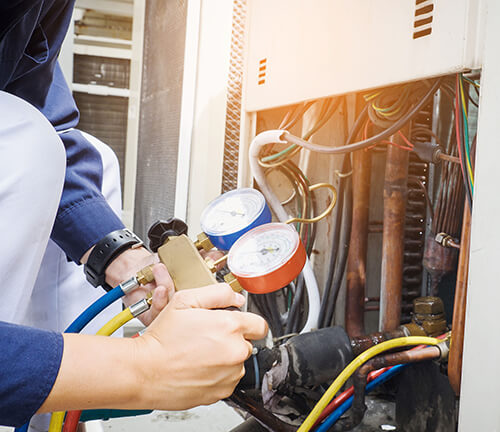Residential and Commercial HVAC Services by DMAKS HVAC Team.
Residential and Commercial HVAC Services by DMAKS HVAC Team.
Blog Article
Energy-Efficient Heating And Cooling Solutions to Reduce Energy Costs
As power prices remain to climb, the relevance of energy-efficient a/c systems ends up being increasingly evident. These systems not only guarantee substantial cost savings on utility costs however likewise add to a more lasting future by lessening power usage. With various options available, consisting of geothermal warmth pumps and ductless mini-splits, building owners deal with a wide variety of choices that can boost convenience and air quality. Comprehending the essential attributes and maintenance demands is crucial to maximizing these benefits. What factors should be prioritized when picking the best system for your requirements?
Benefits of Energy-Efficient HVAC Equipments
Energy-efficient Heating and cooling systems provide various advantages that prolong past plain price financial savings. By consuming much less energy, these systems add to decrease greenhouse gas discharges, helping to battle climate adjustment and promote sustainability.
In addition, energy-efficient a/c systems typically supply improved comfort degrees. A lot of these systems include sophisticated technology that enables much better temperature level control and boosted air quality (DMAKS HVAC). This leads to a healthier interior atmosphere, which is especially crucial for individuals with allergies or respiratory concerns
Additionally, investing in energy-efficient cooling and heating systems can boost home value. As more consumers focus on power performance, homes and buildings geared up with these systems might bring in greater bids in the property market.
Kinds of Energy-Efficient A/c Options
How can house owners and services select one of the most ideal energy-efficient a/c options for their requirements? The marketplace provides a range of energy-efficient HVAC systems, each made to enhance convenience while minimizing power consumption.
One alternative is the variable refrigerant circulation (VRF) system, which effectively controls the temperature in multiple zones within a structure. This system adjusts its cooling agent flow to match the wanted temperature, causing considerable power financial savings.
One more preferred choice is geothermal heatpump, which use the earth's steady temperature level to warmth and awesome spaces. By moving warmth to and from the ground, these systems demonstrate impressive efficiency, specifically in moderate environments.
Furthermore, ductless mini-split systems provide an energy-efficient option for homes doing not have ductwork. These systems enable zone-specific heating & cooling, reducing energy waste in vacant areas.
Last but not least, high-efficiency heating systems and ac unit, with advanced SEER and AFUE ratings, provide dependable environment control while taking in much less power than typical models. By examining these options, house owners and businesses can choose a heating and cooling system customized to their certain demands and power performance goals.
Secret Attributes to Take Into Consideration

Following, investigate the type of compressor utilized in the system. DMAKS HVAC. Variable-speed compressors can change their result to match the heating or cooling visit the site need, leading to improved comfort and energy savings contrasted to single-speed versions. Additionally, try to find systems equipped with clever thermostats that offer programmable setups and remote access, permitting much better control over power consumption
Another essential feature is the system's air filtration ability. High-efficiency filters can boost interior air quality and minimize energy usage by making certain the system runs effectively. Take into consideration the kind of refrigerant utilized; modern-day systems commonly use eco-friendly refrigerants that have a reduced environmental impact.
Last but not visit here least, make certain that the system works with zoning innovation, which permits for tailored temperature level control in various areas of your home, enhancing comfort while reducing energy use.
Tips for Selecting the Right System


Next, take into consideration power efficiency ratings, specifically the Seasonal Power Performance Ratio (SEER) for cooling down systems and the Yearly Gas Usage Efficiency (AFUE) for heater. Higher scores indicate better efficiency, which can bring about substantial cost savings on utility costs gradually.
In addition, evaluate the kind of heating and cooling system that best fits your way of article living and budget plan. Options include central air conditioning, ductless mini-splits, and warmth pumps, each with its own set of benefits and drawbacks.
Don't neglect the significance of proper installment and sizing; an incorrectly sized system can cause inefficiencies and raised wear. Seek advice from with a specialist Cooling and heating specialist to acquire expert referrals tailored to your home's one-of-a-kind requirements. This detailed strategy will certainly make certain that you select an energy-efficient HVAC system that fulfills your demands and spending plan efficiently.
Upkeep for Optimum Effectiveness
Once the appropriate cooling and heating system remains in location, recurring maintenance comes to be vital to making certain optimal efficiency and long life. A well-maintained system operates a lot more effectively, causing lower energy consumption and reduced energy costs. Regular examinations and tune-ups must be set up at the very least twice a year-- when before the cooling period and as soon as prior to the heating season.

Homeowners need to also be attentive about monitoring their heating and cooling system's efficiency. Unusual noises, changing temperature levels, or boosted power expenses can indicate underlying concerns that call for instant interest. By addressing these problems without delay, home owners can avoid pricey fixings and expand the life expectancy of their systems.
Purchasing an upkeep strategy with a certified technician not only enhances efficiency yet likewise provides assurance, recognizing that the system is operating at its finest. DMAKS HVAC. Regular upkeep is as a result vital for maintaining power efficiency and decreasing overall operational expenses
Conclusion
To conclude, energy-efficient heating and cooling systems present a feasible service for reducing utility bills while improving comfort and air high quality. By incorporating innovative technologies and alternatives such as geothermal heat pumps and ductless mini-splits, homeowner can attain substantial energy financial savings and add to environmental sustainability. Cautious factor to consider of system functions and ongoing upkeep further makes sure optimum efficiency, making energy-efficient systems a prudent financial investment for both economic and eco-friendly advantages.
Report this page